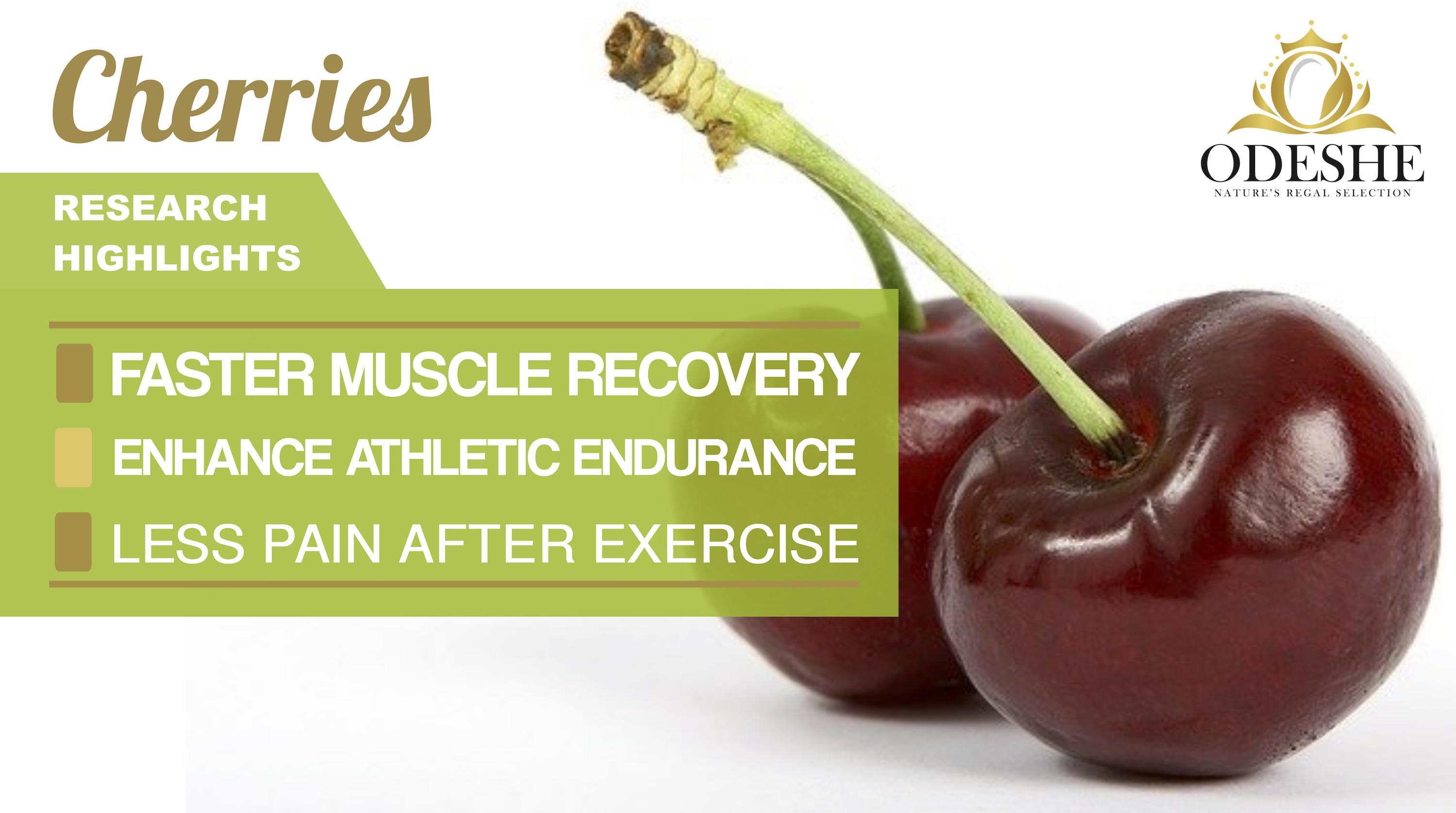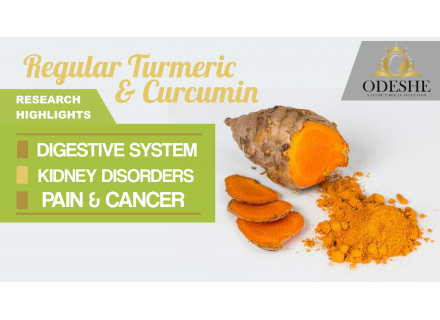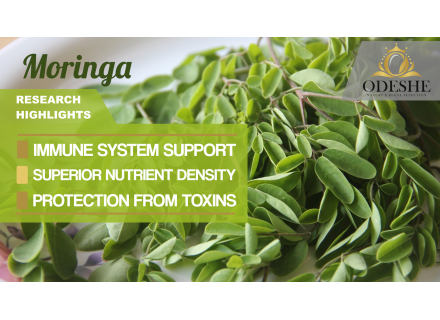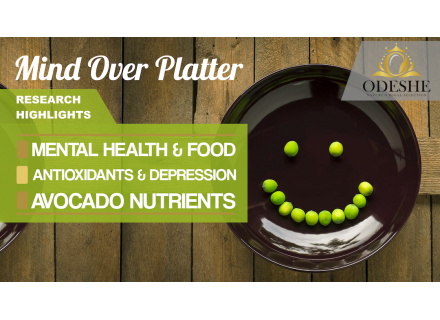Cherries Increase Athletic Endurance and Muscle Recovery after Exercise

Significant exercise generates oxidative stress as the body burns more fuel than when at rest. This has naturally generated interest in anti-oxidants to counter the effects of exercise-related oxidative damage, including abundant damage to various cellular components and premature muscular fatigue from sustained muscle contraction during exercise [1]. Antioxidant supplementation is routine amongst athletes, and although some supplement combinations may actually be inhibitive for certain exercise goals, many types of antioxidants offer profound effects on exercise performance [1]. Multiple studies have established how cherry supplementation improves athlete performance in a diverse range of sports and exercises. The same beneficial antioxidants in cherry also help with post-exercise muscle recovery, and this article summarises some of those research highlights.
'Tis Still the Season to be Healthy
(credit: StockSnap)
Boosted Athletic Endurance.
Cherry in powder form maintains the ability to boost athletic performance. Endurance runners who took a powdered cherry supplement daily for 10 days prior managed “…13 % faster half-marathon race finish times…” than those who were give the placebo instead [2]. These athletes were matched based on their “average reported race pace”, and these runners maintained a pace closer to their average race pace than those on the placebo, indicating improved stamina or a lack of inconsistent speeds.
Concentrated cherry juice also increases athletic output. Football (i.e. soccer) players who took Montmorency tart cherry concentrate exhibited improved performance in specific muscular contraction, sprinting and agility challenges after prolonged intermittent sprint activity [3]. These footballers who had already completed prolonged intermittent sprinting benefited from 2 daily doses of cherry concentrate for 8 days.
Amongst cyclists on a 15 km trial, cherry powder supplementation providing 257 mg of anthocyanin daily produced 4.6% faster completion times than placebo takers [4]. The enhanced muscle oxygenation detected in this experiment suggests that the relaxing effect of cherry’s antioxidant content on blood vessels may be the reason cherries enhance athletic performance. A comparison of multiple studies on cherry’s capacity to improve athletic output detailed that “… acute supplementation with ~ 300 mg polyphenols 1–2 h prior to exercise may enhance exercise capacity and/or performance during endurance and repeated sprint exercise…” [5].
Endurance Gains with LESS Pain?
(credit: ernestoeslava)
Faster Muscle Recovery and Reduced Pain.
Several studies show that endurance athletes (and other athletes) can get pain relief and greater muscle recovery from cherries. The marathon runners mentioned earlier that achieved “…13 % faster half-marathon race finish times…” also benefited from lowered indicators of muscle damage, inflammation and oxidative stress [2]. These effects coincided with a 16-39% elevation in detected antioxidant activity in runner’s bloodstreams as a result of powdered cherry supplements [2]. Taking 2 daily doses of cherry juice for 7 days (including the day of the race) also lowered post-race pain significantly after a 3-stage, 26 km run [6].
Muscle soreness ratings amongst footballers (mentioned previously) were also significantly lower amongst cherry concentrate consumers than those taking the placebo [3]. Athletes performing 10 sets of 10 back squats at 70% maximum ability lowered their post-exercise muscle soreness by prior supplementation with cherry powder capsules for 10 days [7]. At 48 hours post-exercise, muscle damage indicators were lower amongst cherry juice drinkers than those consuming placebo [7]. Another set of marathon runners lowered their post-run muscle damage indicators and muscle pain scores with cherry juice, alongside elevating their antioxidant bloodstream content [8]. These runners also recovered isometric strength at a faster rate than placebo drinkers [8]. Cherry juice-supplementing athletes performing 10 sets of 10 single-leg extensions at 80% of maximal ability recovered their maximum voluntary contractions faster than those taking a calorie-matched fruit concentrate [9]. Even a 4 day course of cherry juice (twice daily) was enough to reduce the exercise-associated loss of strength from 2 x 20 maximum “modified preacher” bicep curls [10].
A 2019 survey of studies identified several experiments unable to observe cherry’s muscle recovery properties [5]. Tests that couldn’t detect any benefits of cherry supplementation may have some limitations to their study design, and those studies conducted by balanced researchers have highlighted genuine trial challenges such as limited inflammatory damage generated [11] and insufficient cherry dosage or low antioxidant-yield of cherry as discussed by Lamb et al. [12]. For example, different types (i.e. cultivars) of Montmorency cherries have up to a 5-fold difference in antioxidant polyphenol content [13], and the most abundant polyphenol amongst cherries is also present in different amounts between different cherries [14]. However, with such a solid base of evidence to review, it became apparent that cherry was only effective at the estimated critical dose of “> 1000 mg polyphenols per day for 3 or more days prior to and following exercise” [5].
Amazing Fitness and Recovery Benefits (credit: Anrita1705)
Even More Researched Cherry Benefits.
It may be surprising that cherries could provide even more to support optimal health, but cherry’s powerful antioxidant content is thought to enhance endurance and muscle recovery, as well as other advantages [15]. Cherries have been experimentally demonstrated to help lower stress, and improve sleep quality and duration [15]. The restorative impact cherries have on circulation (via the blood pressure-lowering signal "nitrite" [16]) also fuel the fruit’s health-promoting effects against heart disease, diabetes [13], memory and cognition [17].
Since cherries are so versatile with their health promoting abilities, hopefully you can fuel your workouts, exercise recoveries and general health with a natural boost!
Disclaimer: If you have medical concerns, please consult your doctor before implementing the opinions in this article. The research highlighted in this article has not been concluded, and so the properties discussed cannot be extrapolated to any product as yet.
(References)
1 Mason, S. A., Trewin, A. J., Parker, L. and Wadley, G. D. (2020) Antioxidant supplements and endurance exercise: Current evidence and mechanistic insights. Redox Biol 35.
2 Levers, K., Dalton, R., Galvan, E., O’Connor, A., Goodenough, C., Simbo, S., Mertens-Talcott, S. U., Rasmussen, C., Greenwood, M., Riechman, S., et al. (2016) Effects of powdered Montmorency tart cherry supplementation on acute endurance exercise performance in aerobically trained individuals. J Int Soc Sports Nutr 13, 22.
3 Bell, P. G., Stevenson, E., Davison, G. W. and Howatson, G. (2016) The Effects of Montmorency Tart Cherry Concentrate Supplementation on Recovery Following Prolonged, Intermittent Exercise. Nutrients, Multidisciplinary Digital Publishing Institute 8, 441.
4 Morgan, P. T., Barton, M. J. and Bowtell, J. L. (2019) Montmorency cherry supplementation improves 15-km cycling time-trial performance. Eur J Appl Physiol 119, 675–684.
5 Bowtell, J. and Kelly, V. (2019) Fruit-Derived Polyphenol Supplementation for Athlete Recovery and Performance. Sports Med 49, 3–23.
6 Kuehl, K. S., Perrier, E. T., Elliot, D. L. and Chesnutt, J. C. (2010) Efficacy of tart cherry juice in reducing muscle pain during running: a randomized controlled trial. Journal of the International Society of Sports Nutrition 7, 17.
7 Levers, K., Dalton, R., Galvan, E., Goodenough, C., O’Connor, A., Simbo, S., Barringer, N., Mertens-Talcott, S. U., Rasmussen, C., Greenwood, M., et al. (2015) Effects of powdered Montmorency tart cherry supplementation on an acute bout of intense lower body strength exercise in resistance trained males. J Int Soc Sports Nutr 12, 41.
8 Howatson, G., McHugh, M. P., Hill, J. A., Brouner, J., Jewell, A. P., Someren, K. A. V., Shave, R. E. and Howatson, S. A. (2010) Influence of tart cherry juice on indices of recovery following marathon running. Scandinavian Journal of Medicine & Science in Sports 20, 843–852.
9 Bowtell, J. L., Sumners, D. P., Dyer, A., Fox, P. and Mileva, K. N. (2011) Montmorency Cherry Juice Reduces Muscle Damage Caused by Intensive Strength Exercise. Medicine & Science in Sports & Exercise 43, 1544–1551.
10 Connolly, D. a. J., McHugh, M. P. and Padilla-Zakour, O. I. (2006) Efficacy of a tart cherry juice blend in preventing the symptoms of muscle damage. British Journal of Sports Medicine, British Association of Sport and Excercise Medicine 40, 679–683.
11 McCormick, R., Peeling, P., Binnie, M., Dawson, B. and Sim, M. (2016) Effect of tart cherry juice on recovery and next day performance in well-trained Water Polo players. J Int Soc Sports Nutr 13, 41.
12 Lamb, K. L., Ranchordas, M. K., Johnson, E., Denning, J., Downing, F. and Lynn, A. (2019) No Effect of Tart Cherry Juice or Pomegranate Juice on Recovery from Exercise-Induced Muscle Damage in Non-Resistance Trained Men. Nutrients 11.
13 Ferretti, G., Bacchetti, T., Belleggia, A. and Neri, D. (2010) Cherry Antioxidants: From Farm to Table. Molecules 15, 6993–7005.
14 Mulabagal, V., Lang, G. A., DeWitt, D. L., Dalavoy, S. S. and Nair, M. G. (2009) Anthocyanin Content, Lipid Peroxidation and Cyclooxygenase Enzyme Inhibitory Activities of Sweet and Sour Cherries. J. Agric. Food Chem., American Chemical Society 57, 1239–1246.
15 Kelley, D. S., Adkins, Y. and Laugero, K. D. (2018) A Review of the Health Benefits of Cherries. Nutrients, Multidisciplinary Digital Publishing Institute 10, 368.
16 Aboo Bakkar, Z., Fulford, J., Gates, P. E., Jackman, S. R., Jones, A. M., Bond, B. and Bowtell, J. L. (2018) Montmorency cherry supplementation attenuates vascular dysfunction induced by prolonged forearm occlusion in overweight, middle-aged men. Journal of Applied Physiology, American Physiological Society 126, 246–254.
17 Kent, K., Charlton, K., Roodenrys, S., Batterham, M., Potter, J., Traynor, V., Gilbert, H., Morgan, O. and Richards, R. (2017) Consumption of anthocyanin-rich cherry juice for 12 weeks improves memory and cognition in older adults with mild-to-moderate dementia. Eur J Nutr 56, 333–341


%203pp_FP200ML_perspective-200x200.png)


